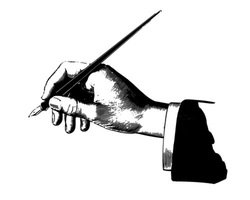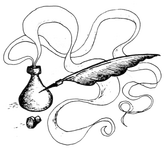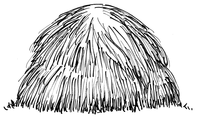Writing Priestly Your Grocery List

Dear old and new friends,
When next you write out your grocery list do so with reverence to Thoth, the Egyptian god of writing and magic. Thoth was the patron god of scribes who employed the gift of the gods, hieroglyphics, “sacred writing.” For each letter the scribes actually inscribed a picture-image—for example, a twisted rope was the scribe’s sign for our “H.” The twisted rope symbol underwent changes as it moved from Hebrew to Greek until around 114 C.E. (A.D.) it evolved into a capital “H” of the Roman alphabet. Reading this Haystack you are actually decoding old roman symbols for ancient image-pictures.
None marvel at being able to write their name or a list of needed food stuffs, or consider it to be a priestly act or Thoth’s magic to make incomprehensible marks standing for milk, eggs and bologna. For commoners, such as you and me, to be able to write has taken a couple of millenniums. Before that in the ancient past that ability was exclusively that of priestly or royal scribes, then clergy, monks, and later a few nobility—but, of course, never the poor and peasants.
We are a nation of immigrants. Except in rare cases our ancestors were unable to write or read, being mostly the poor and uneducated. My Irish great-grandfather, arriving here in 1840, signed his immigrant papers with an “X.” Mindful of your great or great-great immigrant grandparents who also made an “X” in place of their name, take time when you sign your name…and never quickly scribble it.
A story is told about U.S. journalist Horace Greely who in 1841 was editor of the New York Tribune. Greely was notorious for his terrible handwriting, unreadable expect by a certain writer on the Tribune’s staff. One day while this man was out to lunch, two other staff members caught two pigeons off the office window ledge. Inking their claws they had them scamper back and forth crisscrossing a blank piece of paper. Then they took the piece of paper to the writer who translated Greely’s handwriting, telling him it was from Greely. He struggled through the illegible scratches, but was unable to decipher one paragraph. He took it to Greely, who after quickly scanning the page angrily shouted, “What the hell! Am I expected to also do your work? Go, I’ll rewrite the whole page!”
Whenever you have to write your name, pause and do so as clearly and beautifully as you can, and with gratitude for your priestly ability to write. Today writing and reading are considered common for adults, but perhaps writing needs to be rethought. Of writing, Plato (400 B.C.) surprisingly said, “Cannot a man remember? This invention (of letters) will produce forgetfulness in the mind of those who learn to use it, because they will not exercise their memory! Plato continues, ‘the wise man will not write in ink.’”
Plato has a message, even if 2400 years old, for those who know how to write—exercise your memory!


 RSS Feed
RSS Feed